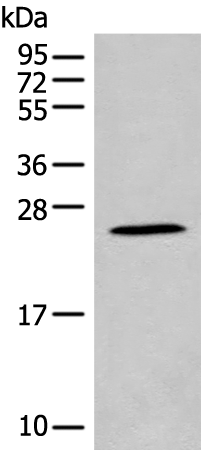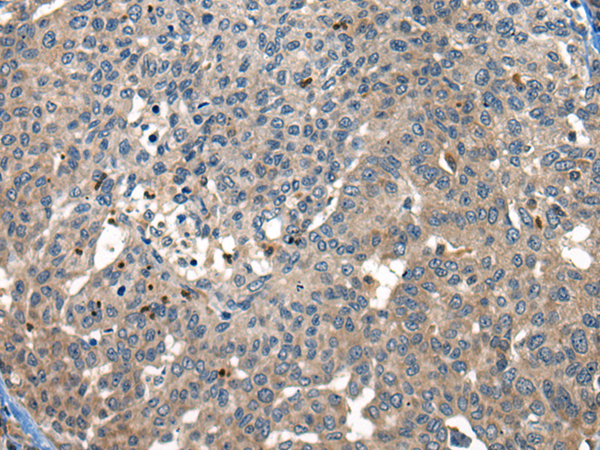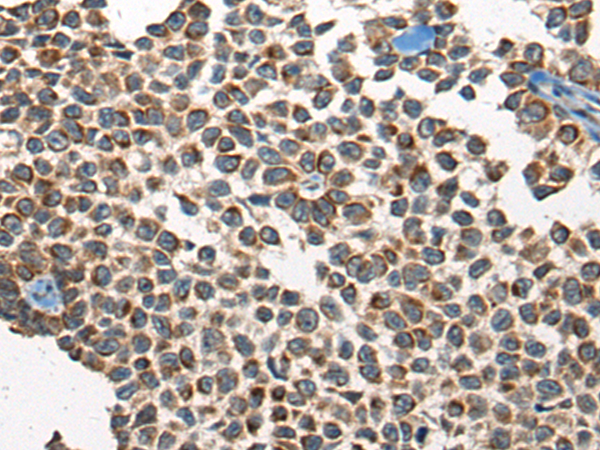


| WB | 咨询技术 | Human,Mouse,Rat |
| IF | 咨询技术 | Human,Mouse,Rat |
| IHC | 1/25-1/100 | Human,Mouse,Rat |
| ICC | 技术咨询 | Human,Mouse,Rat |
| FCM | 咨询技术 | Human,Mouse,Rat |
| Elisa | 1/5000-1/10000 | Human,Mouse,Rat |
| Aliases | COP; COP1; PSEUDO-ICE |
| WB Predicted band size | 23 kDa |
| Host/Isotype | Rabbit IgG |
| Antibody Type | Primary antibody |
| Storage | Store at 4°C short term. Aliquot and store at -20°C long term. Avoid freeze/thaw cycles. |
| Species Reactivity | Human |
| Immunogen | Synthetic peptide of human CARD16 |
| Formulation | Purified antibody in PBS with 0.05% sodium azide and 50% glycerol. |
+ +
以下是关于CARD16抗体的3篇参考文献及其摘要概括:
1. **"CARD16 (COP1) regulates caspase-1 activation and interleukin-1β secretion through an NLRP3-dependent mechanism"**
- **作者**: Pathinayake, P.S., et al.
- **摘要**: 本研究揭示了CARD16通过调控NLRP3炎症小体活性抑制caspase-1的活化,从而减少IL-1β分泌。研究中使用特异性CARD16抗体进行免疫印迹分析,证实其在人气道上皮细胞中的表达及功能。
2. **"CARD16. a new adaptor protein of the caspase recruitment domain family, regulates caspase activation and apoptosis"**
- **作者**: Druilhe, A., et al.
- **摘要**: 该文献首次克隆并鉴定了CARD16(原名COP1/Pseudo-ICE),发现其通过抑制caspase-1和caspase-8通路参与细胞凋亡调控。研究利用CARD16抗体进行共免疫沉淀实验,证明其与caspase-1的直接相互作用。
3. **"The role of CARD-only proteins in inflammasome regulation"**
- **作者**: Kersse, K., et al.
- **摘要**: 综述了CARD-only蛋白家族(包括CARD16)在炎症小体信号中的调节作用,重点总结了CARD16抗体的应用案例(如流式细胞术和免疫组化),强调其在炎症性疾病研究中的潜在价值。
**备注**:CARD16相关研究相对较少,部分文献可能侧重于功能机制而非抗体开发。上述内容综合了功能研究与实验技术描述,实际引用时建议通过PubMed或Web of Science核对文献详情。
The CARD16 antibody targets the caspase recruitment domain-containing protein 16 (CARD16), also known as COP1 or pseudo-ICE, a member of the CARD protein family. CARD16 is involved in regulating inflammatory and apoptotic pathways by modulating caspase activation and NF-κB signaling. Structurally, it contains a CARD domain, enabling interactions with other CARD-containing proteins like caspase-1 and NLRP3. Unlike other CARD family members, CARD16 lacks a pyrin domain, which influences its role as a regulatory molecule rather than a direct inflammasome component.
Antibodies against CARD16 are primarily used in research to study its expression, localization, and function in immune regulation. Studies suggest CARD16 acts as an endogenous inhibitor of inflammasome activity, competing for binding with pro-inflammatory signaling molecules. This regulatory role links CARD16 to autoimmune diseases, cancer, and inflammatory disorders. For example, reduced CARD16 expression has been associated with hyperactive NLRP3 inflammasome responses in conditions like rheumatoid arthritis or sepsis.
Current research focuses on understanding its therapeutic potential, including modulating CARD16 levels to control excessive inflammation. Commercial CARD16 antibodies enable detection via Western blot, immunohistochemistry, or immunofluorescence, aiding mechanistic studies in cellular and animal models. However, its precise physiological and pathological roles remain under investigation, highlighting the need for further exploration of its interactions and regulatory networks.
×